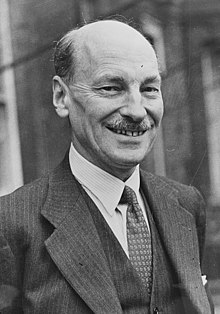Clement Attlee (1883-1967)
Attlee presided over the 1945 - 1951 Labour government. This was the most significant reforming administration of 20th century Britain. It introduced the National Health Service, nationalised one fifth of the British economy, and granted independence to India.
Attlee was born on 2 January 1883. He had a conventional middle-class upbringing, and after going to Oxford University began a career as a barrister. However, he abandoned this to become a social worker in the East End of London, and later joined the Labour Party. He served in the army in World War One.
Attlee rose through the rank and file of the Labour Party, becoming party leader in 1935. His quiet, unassuming personality led many to underestimate him. Plots to replace him were a regular occurrence throughout the next two decades, but Attlee had the self-assurance not to be perturbed by the machinations of his rivals or opponents.
During World War Two, Attlee was a highly successful deputy prime minister in Churchill’s coalition government. Then in 1945, when Labour swept to power in a landslide election victory, his combination of social conscience and staunch patriotism encapsulated Labour’s experiment in democratic socialism. This led to the creation of the National Health Service and the nationalisation of coal mining and the steel industry. Attlee saw his role of premier as that of an umpire, reconciling the opinions of a cabinet composed of powerful personalities. He played a critical role in supporting Bevin’s Cold War diplomacy, and in accelerating independence for India, a cause which he had supported for many years.
The most enduring legacy of the Attlee years is the welfare state. The Labour government implemented many of the ideas expounded in the Beveridge report, a 1942 official study recommending a welfare state to insure people from ‘the cradle to the grave’. It became a national phenomenon, a blueprint for the creation of the ‘New Jerusalem’: a prosperous yet egalitarian society.
Attlee’s welfare state reflected this ambition. All taxpayers contributed to social insurance, and everyone in the country was covered by it. Levels of benefits were standardised. The retirement pension was open to all and could now be claimed at the age of sixty-five rather than seventy. Under a scheme of family allowances, parents would receive a weekly payment upon the birth of their second child (and this would increase with any subsequent children).
Another significant measure was the creation of the National Health Service in July 1948. In replacing the ramshackle and localised pre-war system of healthcare, and in committing the state to treat people free of charge no matter their condition, the NHS quickly became enshrined as a cornerstone of national life.
Clement Attlee’s post-war Labour government also built more than a million homes - a generation was introduced to the joys of indoor toilets, front and/or rear gardens, and where possible a tree could be seen from every window - available to many low-income families for the first time ever. Also, under the National Assistance Act of 1948, local authorities now had a duty “to provide emergency temporary accommodation for families which become homeless through no fault of their own.”
The government pursued radical policies elsewhere. Efforts were made to improve education for the mass of the people through the 1944 Education Act, and – in an attempt to avoid the high unemployment of the thirties – key sectors of the economy were nationalised. The most important were heavy industries like coal and steel, and infrastructure such as railways. The nationalisation programme stood alongside the welfare state as the major legacy of the Attlee Years, enduring for more than three decades.
He died on 8 October 1967.
^ mainly from the BBC.
Wikipedia page for Clement Attlee - https://en.wikipedia.org/wiki/Clement_Attlee#Housing
The New Yorker’s take (opinion article) on Clement Attlee - link
No.10 Gov Site page - through the Web Archive site
